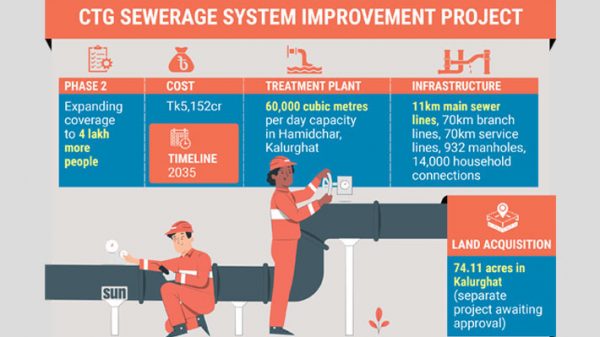Shawdesh Desk:
As part of the ongoing effort to bring more people under sewerage system, Chattogram WASA plans to start a second phase of a different project to provide four lakh additional people with modern facilities.
After almost 65 years since its establishment, the CWASA started implementing the city’s first sewerage system in 2018.
The new phase of the project titled “Chattogram Sewerage System Improvement Project (Catchment-2 and 4)” aims to improve sewerage services in areas such as Lalkhan Bazar, Bagmoniram, Jamal Khan, Chawk Bazar, Chandgaon, Shulokbahar, Sholoshohor and Pahartali.
The deadline for the project, costing around Tk5,152 crore, has been set at 2035.
In 2017, a master plan for the central sewerage system in Chattogram was developed, dividing the city into six regions.
As part of this master plan, the second largest initiative includes the designation of Kalurghat catchment as treatment plant-2 and Bakolia catchment as treatment plant-4.
Recently, this project received approval at the meeting of the Executive Committee of the National Economic Council (ECNEC), chaired by Chief Adviser Prof Muhammad Yunus.
Of the total cost, the Japan International Cooperation Agency (JICA) will provide about Tk4,144 crore as loan assistance, while the government will contribute about Tk581 crore as a loan and Tk387 crore as grants, and Chattogram WASA will provide Tk39 crore from its own fund.
Once implemented, it is expected that around four lakh residents of Kalurghat and Bakolia areas will have access to improved sewerage management by 2035, with further potential to serve a total of 18 lakh people by 2070.
Under this project, a treatment plant with a capacity of 60,000 cubic metres per day will be constructed in Hamidchar area of Kalurghat.
Additionally, the project will include the installation of 11 kilometres of main sewer lines, 70 kilometres of branch sewer lines, 70 kilometres of service lines, 932 manholes and 14,000 household connections. WASA Superintendent and Project Director (PD) Mohammad Nurul Amin told the Daily Sun that the residential, commercial and industrial waste is now being discharged directly into the Karnaphuli and Halda rivers due to the absence of a sewerage system in Chattogram city.
This project aims at creating an eco-friendly and sustainable urban infrastructure and reducing river pollution, he noted.
The PD said the project duration has been set from January 2025 to December 2035.
The first three years will be divided into two phases—one for project design and drawing works and the other for floating tenders and appointing contractors, he said.
The construction work is expected to start fully from the fourth year, he expected.
To implement the major sewerage initiative in the port city, JICA’s consultancy firm, Nippon Koei Ltd, conducted a feasibility study for catchments 2 and 4.
As per the survey, 74.11 acres of land will be acquired in the Kalurghat area.
A separate project titled “Land Acquisition for Construction of Sewage Treatment Plant in Kalurghat, Chattogram City” is awaiting approval from the authorities concerned.
The estimated cost for land acquisition is Tk2,154 crore, of which Tk1,292 crore will be covered by loans from the government, while the remaining Tk862 crore will come from grants.
Mentionable, although the Chattogram WASA initiated the “Project for Establishment of Sewerage System in Chattogram Metropolitan (1st Phase)” in 2018, only 60% of the work has been completed, forcing multiple deadline extensions and raising concerns over the project’s outcome.
The project aimed at introducing the sewerage system by developing sanitation facilities and bringing 20 lakh people of the city under its coverage, lessening dependence on the use of soak-wells, and treating the huge quantity of faecal sludge being generated in the Chattogram city and its suburbs.
In 2017, Chattogram WASA’s Sanitation Master Plan revealed that although 86% of city establishments used sanitary latrines, 64% discharged untreated wastewater directly into drains, bypassing septic tanks.
As a result, black water (toilet water), grey water (wastewater from kitchens and bathrooms), and rainwater continue to flow into the Karnaphuli and Halda rivers on a daily basis, polluting their water with toxic, malodorous waste and solid waste.
This pollution poses a serious threat to aquatic life and the wider ecosystem.






























Leave a Reply